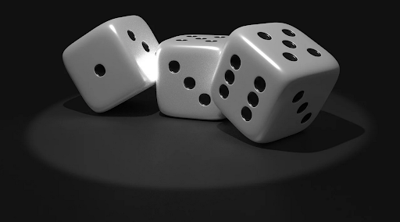
Probability is defined as the extent to which something is probable. In statistical terms, probabilities are expressed in a decimal format or as a percentage. Put simply, a high probability lends itself to a greater likelihood of a favorable outcome. A low probability is associated with an unfavorable outcome. On the spectrum of probabilities, gamers tend to favor high probabilities when specific tasks, duties, actions, or behaviors are taken.
Probability analysis differs from game to game. In card games like blackjack and poker, probability analysis is incredibly important. Players use it as a real-time metric to make crucial decisions regarding their current hands. In blackjack, the probability of busting when drawing another card if your current value is 20 is incredibly high, given that the only card you can afford to receive is an Ace. A high probability of busting means an equally high likelihood of standing.
However, if many high-value cards (excluding Aces as 11) are already on the table, that indicates a high probability of a low-value card coming up next, regardless, the benefits of hitting (requesting another card) must outweigh the risk of busting. This is where blackjack card counting and strategy charts are essential.
How Should Players React to Different Probabilities in Games?
It’s an interesting analysis topic, given that probabilities have different meanings depending on the games you play. In slot machine games, probability has a long-term perspective. In poker games, probability is tactical and pertains specifically to the hand being played at the time. Assuming you’re playing poker games against opponents in real time, probabilities are of tremendous value.
Poker is played not with long-term probabilities but with short-term probabilities. In other words, the cards currently in play on the table and those waiting to be dealt will determine the specific types of actions that players will take. For example, in Zynga Poker Texas Holdem, players are dealt two hole cards, followed by a set of community cards called The Flop. These comprise three cards. The Turn and River cards follow while betting action takes place. Standard poker games aim to form the highest-ranking hand, given the hole and community cards.
In Texas Hold’em, probability determines bet sizing, calls, raises, re-raises, and whether a player wishes to hold or fold. Take several examples of pre-flop probabilities for pocket pairs in poker games. To know the likelihood (probability) of a pair of Aces being dealt, we must multiply the possibility of receiving each card. The following formula is used in this case: 4/52 X 3/51 = 12/2652. This equals 0.45%. That doesn’t necessarily mean much to a layperson, so let’s investigate further.
If you play Zynga poker games online and are dealt 30 hands p/h, you can expect to get a pair of pocket Aces every 7.5 hours. The probability of receiving any of the 13 pocket pairs is 13/221, or 5.9%. But you can expect to receive any pocket pair every 35 minutes on average. In other words, in a pre-flop situation, probabilities are incredibly important, especially if you are looking for a premium starting hand. Any set of pocket pairs does not necessarily yield a winning outcome, that’s why it happens every 35 minutes!
Probability in Slots Games
In social slot machine games, the standard format for expressing probability is RTP. These statistical representations reflect the likelihood of a player receiving a certain return over the long term. In this vein, a high probability RTP is indicative of a favorable return to player percentage over time. It must be noted that RTPs are statistical measures that are evaluated over millions of game outcomes.
For example, a typical social slot machine game may have a probability of 98%. This indicates that for every 100 gold coins (GCs) played, a player will likely receive 98 gold coins back over the long term. An RTP of 88% indicates that a player who plays 100 gold coins (GCs) will likely receive 88 gold coins back over the long term.
A caveat is in order: Probabilities are just that; they are not guarantees. These are statistical reckonings determined by long-term observation (trial and error) of gaming outcomes based on pre-programmed algorithms and set formulae. An 88% or 98% RTP (probability of payback) is assessed over an extraordinarily long time. These measures apply in blackjack, poker, slots, and every other game you can imagine. Anything can happen over the short term.
*Source: https://allmathconsidered.wordpress.com/2017/05/23/the-probabilities-of-poker-hands/



(0) comments
We welcome your comments
Log In
Post a comment as Guest
Keep it Clean. Please avoid obscene, vulgar, lewd, racist or sexually-oriented language.
PLEASE TURN OFF YOUR CAPS LOCK.
Don't Threaten. Threats of harming another person will not be tolerated.
Be Truthful. Don't knowingly lie about anyone or anything.
Be Nice. No racism, sexism or any sort of -ism that is degrading to another person.
Be Proactive. Use the 'Report' link on each comment to let us know of abusive posts.
Share with Us. We'd love to hear eyewitness accounts, the history behind an article.